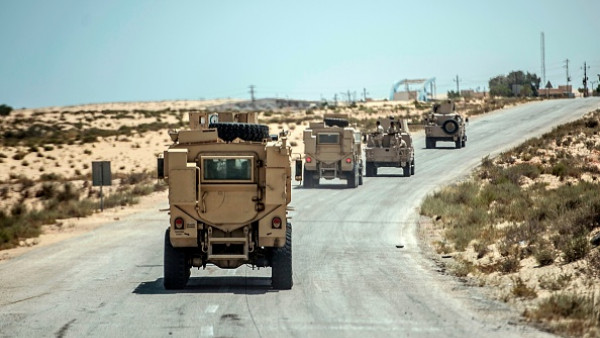There are growing concerns in Egypt over a newly-declared Sinai-based alliance of 30 Bedouin tribes, with questions being raised about the timing, and purpose, of its formation.
Led by controversial businessman Ibrahim Al-Organi (also spelt Arjani or Argani), the Union of Arab Tribes was officially announced on 1 May during a large celebration in the once-restive North Sinai province in the presence of state officials, parliamentarians, tribal leaders, businessmen, and public figures.
Egyptian President Abdel Fattah al-Sisi has been designated as “the honorary chairman” of the group, which was mostly viewed by analysts as an attempt to legitimise the alliance.
Rising influence
Organi had already been the head of the Sinai Tribes Union, a pro-government coalition known to arguably have had the upper hand in maintaining security in the province.
Over the past decade, Organi has emerged as an influential businessman, making media appearances and accompanying officials who visit Sinai, especially following Israel’s brutal war in Gaza, now in its eighth consecutive month.
“It is a known fact that the Union of Sinai Tribes have been functioning as paramilitary militias [reportedly] fighting alongside army and police forces against an insurgency in North Sinai for almost a decade,” a security source told The New Arab.
“The Egyptian regime may have felt if its borders with Gaza, Sudan, and Libya are unstable, that a new security grassroots movement is needed”
Militancy has raged for years in Sinai, intensifying after the 2013 military coup led by the then-defence minister Abdel Fattah el-Sisi against his predecessor, Mohammed Morsi of the Muslim Brotherhood, legally designated as a terrorist group in 2014.
The Sinai-born business tycoon, hailing from the Tarabin tribe, has frequently been accused of using his alleged ties to the regime to expand his influence in North Sinai and business empire in Egypt at large.
“Since 2013, Organi has resurfaced as the most powerful businessman in Sinai who has [allegedly] challenged the security apparatus in the province, even though he had spent almost two years in custody during the era of late [ousted President] Hosni Mubarak,” explained the security source, on condition of anonymity.
|
|
Most recently, local and international news outlets have reported that Organi has been controlling the entry of aid supplies to Palestinians in Gaza and the transport of critical cases to receive treatment in Egypt.
The same reports also claim that his Cairo-based tour company has been offering Palestinians safe passage into Egypt via the Rafah crossing for exorbitant charges as high as $11,000.
Since October last year, Israel’s war on Gaza has killed over 35,000 Palestinians, including at least 14,000 children, with hundreds of thousands on the verge of famine.
The Rafah border crossing, Gaza’s only connection to the outside world through Egypt, has recently been shut down following Israeli ground operations in the Palestinian city of Rafah, which has further hindered the delivery of aid supplies to the besieged strip.
“The new post gives controversial businessman Ibrahim Al-Organi authority over Bedouin tribes across the country”
A state within a state?
“Even though the Egyptian constitution legally bans the formation of unofficial armed groups that have no affiliation to state security bodies, such a ban could not reportedly be applied to Sinai tribes as their influence under Organi has, arguably, intensified over the years,” the security source noted to The New Arab.
But a looming question remains about whether the tribal grouping could, at some point, try to compete with state authorities and turn into “a state within a state”, like the case in war-ravaged neighbouring Sudan.
“The Egyptian regime may have felt that if its borders with Gaza, Sudan, and Libya are unstable, that a new security grassroots movement is needed. The idea of course alarmed many who thought tribalism was on the decline,” Said Sadek, professor of political sociology at the Alexandria-based Egypt-Japan University, told TNA.
“Organi could have only remained the tribal chieftain of Sinai Bedouins. But the new post gives him authority over Bedouin tribes across the country. It is true he has been known as the strongest man in Sinai who fought against terrorism with the army, a situation similar to the Awakening Movement in Iraq that fought ISIS,” Sadek argued.
The prominent political sociologist, however, rules out scenarios similar to those that have taken place in neighbouring Sudan or Libya.
“The power of the tribal union in Egypt is limited to border areas [where Bedouin tribes mostly reside] and backed by the army, not rivalling it, unlike the case with Sudan for example,” Sadek argued.
“I see the fears about the Union of Arab Tribes acting as a state within a state as exaggerated,” he added.
In the days following the official celebration of the union this month, the group’s official spokesman, MP and journalist Mostafa Bakry, a controversial figure himself for being loyal to Sisi and his predecessors, relentlessly defended the group’s true mission.
|
|
Bakry argued that the union had been officially registered by the Ministry of Social Solidarity as a non-governmental organisation (NGO) to carry out social and developmental activities unrelated to security or politics.
Renowned author and political analyst Dr Ammar Ali Hassan begs to differ, though.
In an interview broadcast live on Al-Araby TV, the sister station of TNA, Hassan described the union as “a tribal gathering given a legitimate status…but meant to play a political role”.
“For example, ousted Sudanese President Omar El-Bashir was the one who created the Rapid Support Forces [RSF] as a paramilitary group to support the army,” Hassan explained.
“Little did [Bashir] know at the time that he had activated a time bomb in Sudan.”
Thaer Mansour is a journalist based in Cairo, reporting for The New Arab on politics, culture and social affairs from the Egyptian capital

